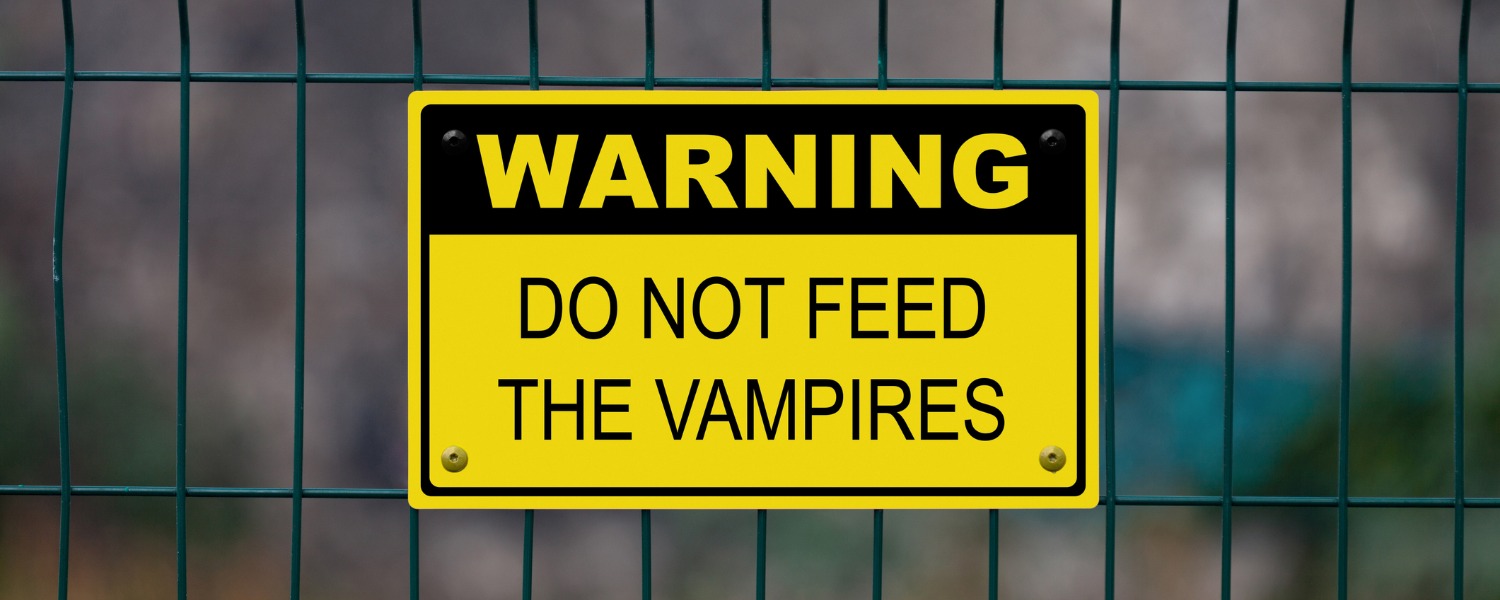There are vampires in every home. They never sleep and are always hungry, sucking the energy from your home and your wallet. You can recognize them by a red glow in the dark.
The vampires are your gadgets that stay on continuously, even after you’ve turned them off.
According to the Natural Resources Defense Council and Sense’s own research, energy vampires consume 23% of the average home’s energy — simply by staying on continuously. This means that the average home is spending $277 to $530 annually just to keep the vampires alive.
What can you do to drive a stake through the heart of your energy vampires and save hundreds of dollars? Here are three simple steps to get rid of vampires.
Step 1
Start by figuring out how much your vampires devices are costing you. The Sense Home app includes these kinds of devices in the Always On category. Look at your total Always On to figure out how much of your utility bill is wasted on devices that run continuously. Tap the Always On bubble to find more details, including the total estimated cost per year. Ready to take action?
Step 2
Now let’s find those vampires. We’ve identified common energy vampires to get you started. If you have any of these in your home, use the Sense Power Meter to figure out how much energy they are sucking from your home. Just turn the device on and off while looking at the Power Meter to see exactly how much energy it wastes.
Start with these:
- Swimming pools. Between pool pumps and heaters, the cost of a pool can add up and up. Annual cost: $310-620.
- Hot tubs. All that hot water doesn’t come cheap. Leave it off until you are in the mood for a soak. Annual cost: $600-1200.
- Aquariums. An aquarium with pump, heater, and lamp can cost $164 annually.
- Home entertainment systems. Watch out for the high energy demands of cable DVRs, old plasma TVs, game consoles, speakers, and sound bars. For detailed information on consumer electronics and energy, check out this report from the Consumer Technology Association.
- Coffee makers. Single-serve machines use a heating element to keep the water warm at all times, draining 60W per hour continuously and adding up to $60 annually to your bill.
- Surveillance cameras. A great way to catch porch pirates, but a single Nest camera uses up to 7-9W continuously, costing $7-17 annually, depending on your utility rates.
- Incandescent spotlight bulbs. Annual cost: $210 for six 100W bulbs turned on 8 hours a day.
This list is just a starting point. Keep looking for your very own vampires, which may be different from these. If you’re ready to take an even deeper dive into your Always On load, check out this post.
Step 3
Get rid of the vampires.
- Turn them off. Do your vampires really need to be running all the time? If not, unplug them when not in use or put them on smart power plugs or strips like the ones from TP-Link and Wemo.
- Replace vampires. Do research about your vampires and replace them with more efficient models. For instance, a variable-speed pool pump could reduce your pool’s energy demands dramatically (see this story from one of our customers). When it comes to purchasing consumer electronics, only 38% of consumers say that energy efficiency is very important to them when choosing which model of consumer electronics to purchase. Check for the ENERGYSTAR certification for any gadget before you bring it into your home!
- Let fewer vampires into your home. While gadgets like smart TVs and mobile phones have become very efficient, having lots of consumer electronics in your home adds up. The Consumer Technology Association estimates that 12% of a home’s average utility bill goes to consumer electronics.
At Sense, we did our own analysis of vampire devices that are Always On. Our research found that the top 90% of Sense households (measured by energy consumption) used 15x the vampire energy of the bottom 10%. They were larger homes filled with more than twice as many consumer electronics and other Always On devices. All those gadgets were driving up energy bills.
This Halloween, if you have vampires in your house — and we suspect you do — start hunting!
